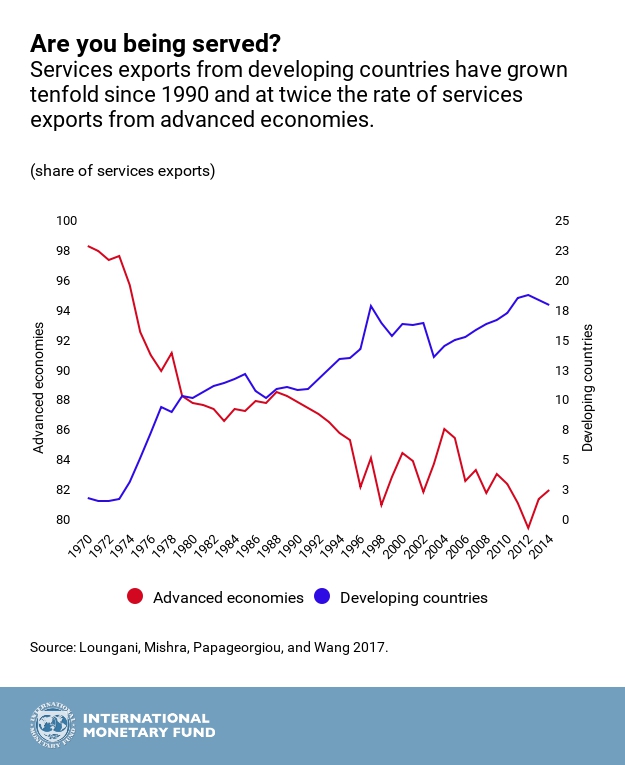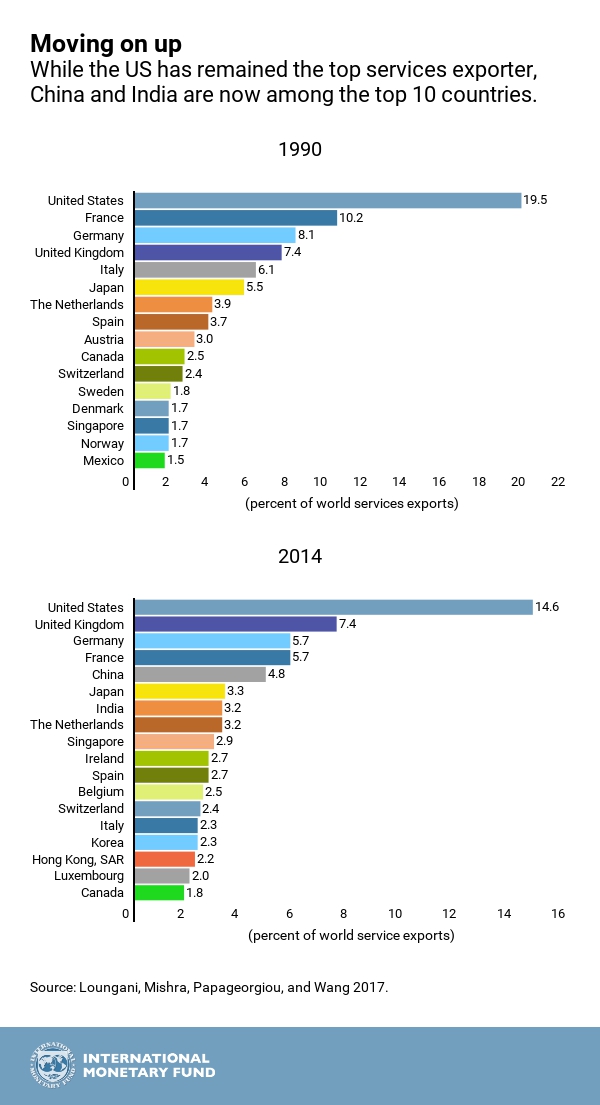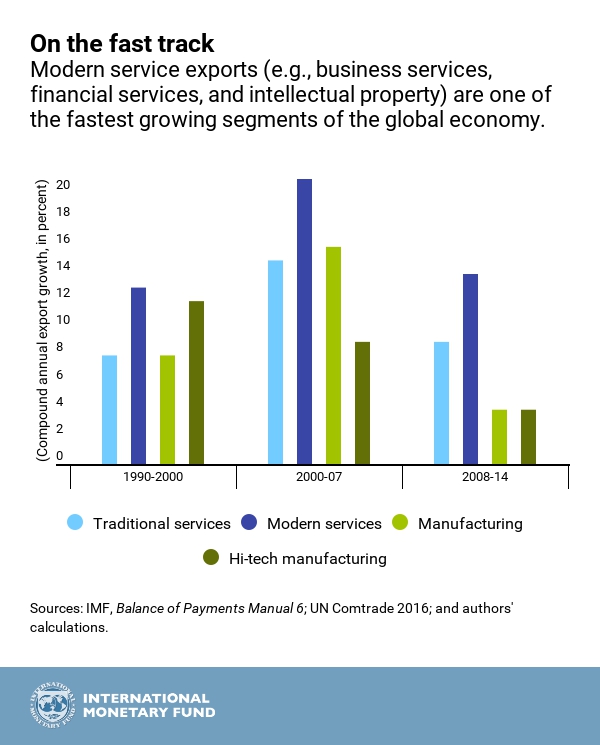Versions in 中文 (Chinese), Français (French), 日本語 (Japanese), and Русский (Russian)
Services, which already account for 50 percent of world income and 70 percent of employment, are also becoming an important part of international trade. Services exports—accounting for nearly one fourth of total exports—have come to play a central role in the global economy, thanks in large part to advances in technology.
Rapidly declining telecommunication costs, increasing internet adoption around the world, and proliferation of broadband internet services have made it possible to deliver services across long distances. While a haircut still requires a trip to the local barbershop, many other services, such as insurance or medical diagnoses, no longer require the provider to be close to the customer.
In our new paper, we track this development with a rich detailed dataset on global trade in services. We make the case that such virtual trade in services are not only catching up with exports of goods in many countries, but it can offer opportunities for new sources of growth, that could help raise productivity and jobs, especially in emerging and developing economies.
New source of growth for developing economies
Since many countries can take advantage of these technological advances, the rise in services exports is not confined to advanced economies. Services exports from developing countries have grown tenfold since 1990, and at twice the rate of services exports from advanced economies; hence, developing countries’ share has increased from 3 percent in 1970 to almost 20 percent in 2014. This increase is not just due to higher exports of traditional services, such as travel and transport, but is also due to modern technology-enabled services as well, such as business services (including research and development, and consultancy), computer and information services, financial services, and intellectual property.
Recent evidence shows that services seem to experience productivity growth through the same mechanisms that traditionally have made manufacturing the key driver of growth. Technology allows for services to be increasingly unbundled: a single service activity can now be fragmented into tasks that are done at different geographic locations, such as business process outsourcing and online banking services. As with goods, services productivity can rise because of specialization (a finer division of labor) and scale (falling unit costs of production).
New data set to track services exports
While it may be too early to tell definitively if the drivers of growth are indeed moving from manufacturing into services, the rise in services exports is an important development to track. Our paper contributes to this effort by introducing a new dataset on global trade in services for 192 countries from 1970 to 2014. We use information from the IMF’s Balance of Payments Statistics database to track developments in 66 services exports subsectors. A web portal provides access to the data and tools to produce charts and stylized facts.
Using this rich data, we document the global trends in services exports and how countries differ on various dimensions of services exports. At the global level, computer and information services and financial services have emerged as two of the most important sectors in the services exports basket. In 2014, world exports of computer and information services reached $300 billion, 10 percent of the total. Similarly, exports of financial services have grown rapidly, and have bounced back since the Global Recession to reach almost $350 billion in 2014.
The chart below presents the share of selected countries in world services exports in 1990 and 2014. The United States has remained the top services exporter, though its importance has declined significantly. Though well known as an exporter of goods, China has also become an important services exporter (ranked fifth in 2014). India, well known for its exports of business process outsourcing and support services for finance and medicine, is also now one of the top 10 countries, with its share of services exports tripling to over 3 percent of world service exports during the period 2000–13. Thailand, Brazil, Indonesia, and Egypt are in the top 30 and moving up rapidly.
Implications for growth strategies
Our dataset can be used by researchers and policymakers to study the growing importance of modern services in the global economy and the role of services exports in the process of structural transformation. Traditional services such as transport, travel or retail still require physical presence; however, they too are gaining from being an integral part of global value chains, and increased tradability due to significantly lower costs enabled by breakthrough technologies, including in fuel efficiency. In addition, the shift to export of modern services has spread across countries at different income levels, making them one of the fastest growing segments of world trade.
Many emerging markets, including China and India, are seeking service-led sources of growth. Service-led growth also offers opportunities for diversification and competitiveness for countries across the development spectrum, particularly to resource-rich and low-income countries. Services now contribute significantly to the productivity of many manufacturing industries—countries need services to develop their manufacturing sectors such as using information and communications technology services to improve production efficiency and lower production cost.
Trade in services offers opportunities for labor reallocation and job creation, and could help address the growing polarization of labor markets. Preliminary evidence suggests that on average, countries that experience higher growth in services exports also experience faster job growth. Services trade has also been more resilient than trade in goods to shocks and financial crisis, and services exports from developing countries have been generally more resilient than those from advanced economies.
A global win-win
These glimpses from our dataset suggest that export of services may be a game-changer, offering an opportunity to sustain global economic integration. For advanced economies, trade in very high-tech services could help them retain some global competitive edge. At the same time, the growing tradability of services can aid the diversification strategy of resource-rich countries and low-income countries. And for many countries, services may offer a pathway to inclusive growth, for instance by offering work opportunities for women.









